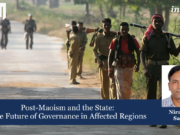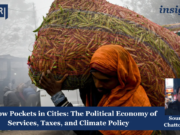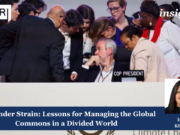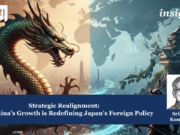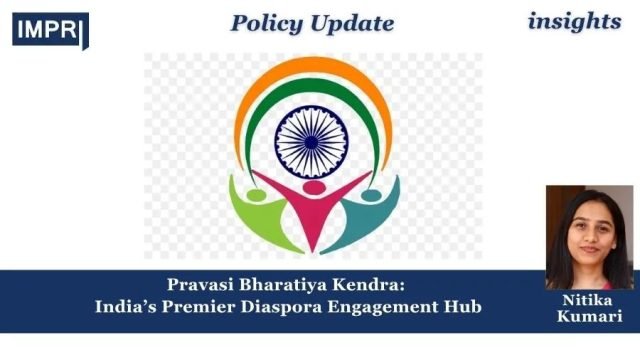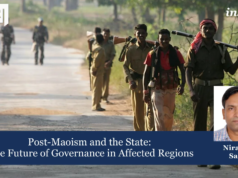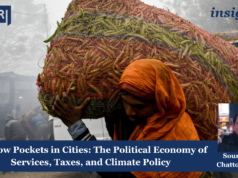Policy Update
Nitika Kumari
The Pravasi Bharatiya Kendra (PBK), currently called Sushma Swaraj Bhawan, is a pioneering institutional setup devised by the Government of India to enhance relations with the Indian diaspora across the globe. The Kendra is both a material expression of India’s dedication to its diaspora and a platform of strategy for engaging the economic, social, and cultural resources of the estimated more than 28 million Indians living across the globe.
It was inaugurated by PM Narendra Modi on 2 October 2016, which is Gandhi Jayanti—Gandhi’s birth anniversary. PM Narendra Modi highlighted that “Mahatma Gandhi had left India, but the call of the nation brought him back” during the opening ceremony. The PBK is dedicated to the Indian diaspora, reflecting Gandhi’s journey as the ultimate “Pravasi” (exile/traveler) who returned to lead India’s freedom movement.
The Prime Minister also underscored the phenomenon as a “brain deposit”, saying these individuals will “serve their motherland at an appropriate time” “Brain drain worries can be converted into brain gain if we see the Indian diaspora as a strength rather than counting them just as numbers.”
HISTORICAL CONTEXT AND ESTABLISHMENT
The Pravasi Bharatiya Kendra (PBK) was conceptualized based on the 2002 recommendations of the Shri L.M. Singhvi-chaired the High-Level Committee on the Indian Diaspora, which specifically underscored building bridges between India and the diaspora. It suggested establishing a dedicated center—Pravasi Bharatiya Bhavan—to provide a networking facility and also to mark the odyssey and contributions of the Indian diaspora.
The concept was officially declared by Prime Minister Atal Bihari Vajpayee in the 2004 Pravasi Bharatiya Divas (PBD). The foundation stone was laid down in 2011 by Prime Minister Manmohan Singh. Completed at a cost of approximately Rs. 80 crores, the Kendra was opened on 2nd October 2016. The creation is a testament to India’s increasing awareness of the economic, cultural, and social contributions of the diaspora, with more than 28 million overseas Indians creating a strong global community bound together by a common sense of ‘Indian-ness.’
LOCATION AND ARCHITECTURAL SIGNIFICANCE
Pravasi Bharatiya Kendra has been placed strategically in the center of India’s capital at Plot No. 15A, 15B, and 15D, Dr. Rizal Marg, Chanakyapuri, New Delhi. The location in the diplomatic enclave of New Delhi’s Chanakyapuri is especially important as it puts the facility near embassies and high commissions, making it easy for diplomatic and international outreach activities. The overall plot size measures around 9,800 square meters (2.40 acres), which offers a large enough area for the extensive facilities accommodated within the complex.
Its facilities are both modern and adaptable, beginning with a sleek, high-end auditorium that can seat up to 300 to 350 individuals in a theatre setting, fully loaded with state-of-the-art audio-visual equipment for top-of-the-line events. There are three conference rooms that seat 20–35 participants and four lecture halls, each seating 65, all well-adapted for seminars, meetings, and training sessions. The facilities enable PBK’s wider mandate for education and outreach.
Dinner and banqueting facilities are also nicely planned, featuring a banquet hall that will accommodate 120–150 people for sit-down functions and more than 300 for buffets. The dedicated restaurant space measures 575 square meters and provides both vegetarian and non-vegetarian food, run through an in-house catering operation. For accommodation, there are 24 guest rooms—14 double-beds and 10 twin-beds—reserved exclusively for Overseas Citizens of India (OCI) and Persons of Indian Origin (PIO). Non-resident Indians (NRIs), though not eligible to stay, have access to other public amenities.
PBK also has two important museums. The first is an open-to-the-public digitally interactive Gandhi Museum, which honors the life, philosophy, and world influence of Mahatma Gandhi. The second is the Diaspora Museum, which displays Indian migration, the difficulties encountered overseas, and the important achievements of the Indian diaspora around the world.
For business infrastructure, PBK consists of a professional meeting business center, and three VVIP lounges to support high-ranking diplomatic interactions. Convenient amenities encompass a 95-car basement parking facility with 100% power backup and a centralized security system of 24/7 personnel and CCTV monitoring. Operational effectiveness is supplemented through a centralized air-conditioning system, a 60 KLD sewage plant, and a 200 KL fire-fighting system. The center has also trained hospitality staff serving for housekeeping, event planning, and IT services.
Collectively, these characteristics make PBK an iconic institution symbolizing India’s dedication to its global citizens.
ORGANIZATIONAL OBJECTIVES AND STRATEGIC GOALS
HUB FOR DIASPORA ACTIVITIES
1. To act as a centre for information, knowledge, and policy on Indian diaspora-related issues.
2. To honour the role of overseas Indians in the development of India and its global position.
3. To facilitate cultural interaction between India and its diaspora worldwide through exhibitions, seminars, and functions.
4. To offer a forum for exchange of views on issues of Indian migrants, returnees, and international policies touching their lives.
5. To organize Pravasi Bharatiya Divas (PBD) and other diaspora-related events.
6. To facilitate research and policy making in diaspora studies and international relations.
7. To conserve the legacy and experiences of Indian emigrants in archives, a museum, and a library.
The Pravasi Bharatiya Kendra (PBK) has become a vibrant forum for creating sustainable and mutually rewarding interaction between India and its diaspora. It periodically organizes workshops, seminars, conferences, and cultural programs where overseas Indians, Indian authorities, business leaders, and civil society interact with each other and exchange knowledge, network, and discuss policies. The complex accommodates a varied range of functions—government ministries utilize it for policy discussions and programme launches, public sector enterprises for business collaborations, and embassies and international organizations for diplomatic functions. It is also an event space for academic seminars, cultural events, and literary programs, facilitating cultural bonding and diaspora interaction.
The Pravasi Bharatiya Samman Award (PBSA) is the Government of India’s most prestigious award for Non-Resident Indians (NRIs), Persons of Indian Origin (PIOs), and organizations founded and managed by them. The award is distributed at the Pravasi Bharatiya Divas (PBD) conference, a flagship event held to mark the success and contribution of overseas Indians. The conference is usually organized at the Pravasi Bharatiya Kendra (PBK).
INDIA DEVELOPMENT FOUNDATION FOR OVERSEAS INDIANS (IDF-OI)
India Development Foundation for Overseas Indians (IDF-OI), which is based in PBK, is a not-for-profit trust set up by the Government of India to be a meaningful and well-organized platform for the diaspora to contribute to the development of their country. It seeks to nudge and enable philanthropic contributions from Non-Resident Indians (NRIs) and People of Indian Origin (PIOs) by linking their inclination to contribute with effective government-sponsored initiatives.
The foundation encourages participation in all top national programs like Swachh Bharat (Clean India), Digital India, Beti Bachao Beti Padhao, and other flagship projects for enhancing infrastructure, education, sanitation, health, and rural development. Through transparency and accountability in diaspora contributions, IDF-OI ensures that foreign assistance is properly directed towards change-making projects in the nation. Not only does it tighten the emotional and cultural link between foreign Indians and their native land, but it also makes them stakeholders in India’s socio-economic growth.
CULTURAL DIPLOMACY AND SOFT POWER PROJECTION
Pravasi Bharatiya Kendra (PBK) is very important in promoting India’s cultural diplomacy and soft power by consistently arranging programs to showcase the nation’s rich diversity of traditions, languages, arts, and philosophical culture. These events not just fortify relationships with the Indian diaspora but contribute towards favourable global images of India. Through festival celebrations of Indian holidays, concerts of classical music and dance, and literary evenings with diaspora authors, PBK assists in the maintenance of cultural identity among overseas Indians and connects generations. Moreover, non-Indian publics are drawn to the cultural activities, increasing global appreciation of Indian civilization. These interactions support India’s strategic interests by encouraging diplomatic dialogue, trade partnerships, and international cooperation.
FUTURE TRAJECTORY:
PBK will have to involve the diaspora in global issues such as climate change, sustainable development, women’s empowerment, and digital transformation.
Thematic conferences, research initiatives, and partnership schemes must be employed to direct diaspora knowledge toward national agendas.
PBK will have to operationalize its programs to reach second and third-generation overseas Indians by highlighting innovation, entrepreneurship, and cultural identity.
New programs will have to be planned to uphold Indian identity without sacrificing the globalised youth diaspora appeal.
Regional centers, if established, would facilitate more tailored and accessible diaspora engagement based on local agendas.
REFERENCES
Ministry of External Affairs. (n.d.). Pravasi Bharatiya Kendra. https://www.mea.gov.in/images/pdf/pravasi-bhartiya-kendra.pdf
Ministry of External Affairs. (n.d.). Pravasi Bharatiya Kendra – Brochure. https://www.mea.gov.in/images/attach/pravasi_bhartiya_kendra_new_new.pdf
Tripathi, S. (2023, January 4). The diaspora and India’s growth story. Observer Research Foundation. https://www.orfonline.org/research/the-diaspora-and-india-s-growth-story
IMPRI Impact and Policy Research Institute. (2023, January 9). Pravasi Bharatiya Divas: 9 January. https://www.impriindia.com/insights/pravasi-bharatiya-divas-9-january/
India Today. (2016, October 2). Brain drain can be converted into brain gain: PM Modi. https://www.indiatoday.in/india/story/brain-drain-can-be-converted-into-brain-gain-pm-modi-344380-2016-10-02
ABOUT THE CONTRIBUTOR:
NITIKA KUMARI is a postgraduate student of Defence and Strategic Studies at the Central University of Gujarat (2024–2026). She holds a Bachelor’s degree in Political Science and Economics from Ramjas College, University of Delhi. Her core research interests include classical and contemporary strategic thought, India’s national security environment, and the evolving nature of warfare.
Acknowlegement: The author sincerely thanks Ms. Aasthaba Jadeja and the IMPRI team for their valuable support.
Disclaimer: All views expressed in the article belong solely to the author and not necessarily to the organisation.
Read more at IMPRI:



